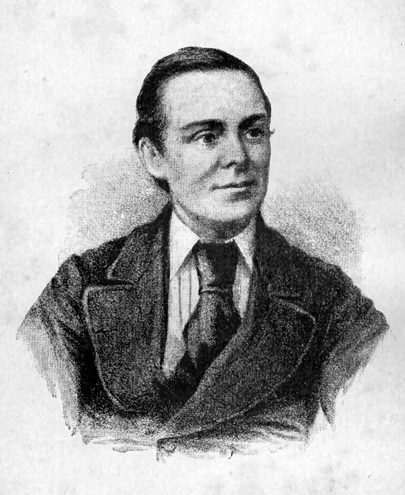D.L. Moody tells about Henry Moorhouse:
“In 1867, when I was preaching in Dublin, at the close of the service a young man, who did not look over seventeen, though he was older, came up to me and said he would like to go back to America with me, and preach the Gospel. I thought he could not preach it, and I said I was undecided when I could go back. He asked me if I would write to him, as I did not know whether I wanted him or not. After I arrived at Chicago I got a letter saying he had just arrived in New York, and he would come and preach. I wrote him a cold letter, asking him to call on me if he came West. A few days after I got a letter stating he would be in Chicago next Thursday. I didn’t know what to do with him. I said to the officers of the Church, ‘There is a man coming from England, and he wants to preach. I am going to be absent Thursday and Friday. If you will let him preach on those days I will be back on Saturday and take him off your hands.’ They did not care about his preaching, being a stranger; but at my request they let him preach. On my return on Saturday I was anxious to hear how the people liked him, and I asked my wife how that young Englishman got along. How did they like him? She said they liked him very much. ‘He preaches a little different from what you do. He tells the people God loves them. I think you will like him.’ I said he was wrong. I thought I could not like a man who preached contrary to what I was preaching. I went down on Saturday night to hear him, but I had made up my mind not to like him, because he preached different from me.”
After graphically describing the six nights on John 3. 16, Moody concludes: “In closing up that seventh sermon, he said, ‘For seven nights I have been trying to tell you how much God loves you, but this poor stammering tongue of mine will not let me. If I could ascend Jacob’s ladder and ask Gabriel, who stands in the presence of the Almighty, to tell me how much love God the Father has for this poor lost world, all that Gabriel could say would be, that “God so loved the world, that He gave His only begotten Son, that whosoever beliveth in Him should not perish, but have everlasting life. “‘ I have never forgotten those nights. I have preached a different Gospel since, and I have had more power with God and man since then. ” Ever after he was a close, personal friend and helper of Messrs. Moody and Sankey. Fleming H. Revell, the, American Publisher, who died in 1931, was present at these services, and confirms the story as here stated.
And a note about this cemetery:
the Ardwick Cemetery in Chorlton, Manchester, Lancashire County, England. It dates back to 1836 in the heart of the city of Manchester and had over 80,000 burials until it was closed to any further burials in 1950. Sure, the cemetery plots are no longer available and all the land was used. However, then 15 years later to remove all the headstones and monuments; crushing the stone and granite to pieces and to totally cover up the burial plots seems in disregard to those buried there, their families and descendants.
That was the actual situation that occurred at the Ardwick Cemetery in 1965. The city did record the basic information off of each headstone and the names, dates are available at the Manchester Monumental Inscriptions with the Manchester Central Library, but the full headstone and whatever was originally inscribed is gone forever.
As if that was not bad enough, the cemetery land was then covered over with soil and sod, and made into a school playground. The very area where thousands of Manchester residents were laid to rest forever is where soccer games are played today. A monument plaque does stand at the entrance to the named Nicholls Field playground, stating this was once Ardwick Cemetery, but anything else relating to its existence is gone forevermore.
Image Credit: Ellis, Paul. “The Greatest Grace Preacher You’ve Never Heard Of.” Escape to Reality, 2 Jan. 2021, escapetoreality.org/2020/06/04/the-greatest-grace-preacher-youve-never-heard-of.
Related
Sorry, no records were found. Please adjust your search criteria and try again.
Sorry, unable to load the Maps API.
